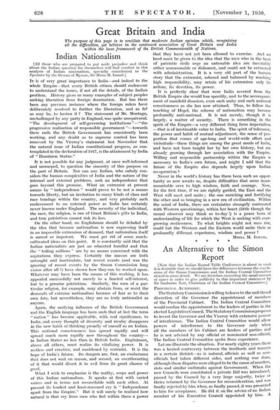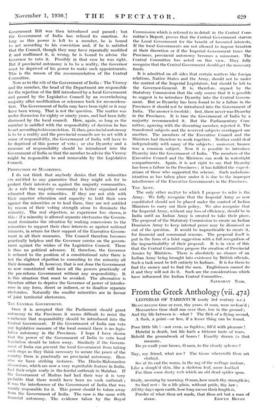An Alternative to the Simon Report
[Now that the Indian Round Table Conference is about to meet it is desirable that we should have the differences between the conclu- sions of the Simon Commission and the Indian Central Committee stated in some detail. We are therefore exceeding the usual amount of space in order to give publicity to this important statement by Sir Sankaran Nair, Chairman of the Indian Central Committee.]
PROVINCIAL AUTONOMY.
The Statutory Commission is willing to leave to the unfettered discretion of the Governor the appointment of members of the Provincial Cabinet. The Indian Central Committee would confine the appointment to the leaders of parties in the elected Legislative Council. The Statutory Commission proposes to invest the Governor and the Viceroy with extensive powers of interference. The Indian Central Committee would allow powers of interference to the Governor only when all the members of his Cabinet are leaders of parties and lie is not advised by any official or nominated non-official. The Indian Central Committee spoke from experience.
Let me illustrate the situation. For nearly eighty years there was a heated controvery between the landlords and tenants in a certain district—as is natural, officials as well as non- officials had taken different sides, and nothing was clone, although these disputes were alleged to be the cause of murders, riots and similar outbreaks against Government. When the new Councils were constituted a private Bill was introduced, passed by the Council by a very large majority, twice or thrice returned by the Governor for reconsideration, and was finally rejected by him when, as finally passed, it was presented to him for acceptance. He did it on the advice of an Indian member of his Executive Council appointed by him. A
Government Bill was then introduced and passed ; but the Government of India has refused its sanction. As long as this power is left to a member, he is bound to act according to his conviction and, if he is satisfied that the Council, though they may have repeatedly modified it and reaffirmed it, is wrong, he is bound to advise the Governor to veto it. Possibly in that case he was right. But if provincial autonomy is to be a reality, the Governor must be deprived of his power to make such appointments. This is the reason of the recommendation of the Central Committee.
Now as to the role of the Government of India : The Viceroy and the member, the head of the Department are responsible for the rejection of the Bill introduced by a local Government and passed by the Legislative Council by an overwhelming majority after modification or reference back for reconsidera- tion. The Government of India may have been right or it may have been wrong. That is not the question. The matter was under discussion for eighty or ninety years, and had been fully discussed by the local council. Here, again, so long as the member is saddled with the responsibility of decision he has to act according to his conviction. If, then, provincial autonomy is to be a reality and the provincial councils are to act with a sense of responsibility, the Government of India will have to be deprived of this power of veto ; or else Dyarchy and a measure of responsibility should be introduced into the Government of India so that the member to advise the Viceroy might be responsible to and removable by the Legislative Council.
PROTECTION OF MINORITIES.
I do not think that anybody denies that the minorities are entitled to any guarantee that they might ask for to protect their interests as against the majority communities. As a rule the majority community is better organized and educated than the minorities. If they are not able with their superior education and capacity to hold their own against the minorities or to lead them, they are not entitled by reason of their voting strength alone to dominate the minority. The real objection, as experience has shown, is this : if a minority is allowed separate electorates the Govern- ment dominates the situation by making concessions to the minorities to support their class interests as against national interests, in return for their support of the Executive Govern- ment in all their measures. The Council therefore becomes practically helpless and the Governor carries on the govern- ment against the wishes of the Legislative Council. There is thus no political advance. If, therefore, the Governor is reduced to the position of a constitutional ruler there is not the slightest objection to conceding to the minority all their demands. If, however, that is not done the Government as now constituted will have all the powers practically of the pre-reform Government without any responsibility. It is this situation that must be avoided. The alternative is therefore either to deprive the Governor of power of interfer- ence in any form, direct or indirect, or to disallow separate electorates. Naturally the smaller minorities are in favour of joint territorial electorates.
THE CENTRAL GOVERNMENT.
Once it is accepted that the Parliament should grant autonomy to the Provinces it seems difficult to resist the conclusion that responsibility should be introduced into the Central Government. If the Government of India can veto any legislative measure of the local council there is no legis- lative autonomy in the Provinces. I hope I have shown that the power of the Government of India to veto local legislation should be taken away. Similarly if the Govern- ment of India can prevent the local Government from taking welt steps as they think necessary to secure the peace of the country there is practically no provincial autonomy. Here also we have striking instance. The Hindu-Mahomedan dissensions, which are now a very regrettable feature in India, had their origin really in the fearful outbreak in Malabar. If the Government of Madras had had their way it is very probable that there would have been no such outbreak ; it was the interference of the Government of India that was mainly responsible for it. This power should be taken away from the Government of India. The case is the same with financial autonomy. The evidence taken by the Royal Commission which is referred to in detail in the Central Com- mittee's Report, proves that the Central Government starves the Local Government for the benefit of favoured interests. If the local Governments are not allowed to impose taxation at their discretion or if the Imperial Government taxes the Provinces, provincial autonomy becomes a misnomer. The Central Committee has acted on this view. They fully recognize that the Central Government should get the necessary funds.
It is admitted on all sides that certain matters like foreign relations, Native States and the Army, should not be under the control of the Imperial Legislature, but should be left to the Governor-General. It is, therefore, argued by the Statutory Commission that the only course that it is possible to suggest is to introduce Dyarehy into the Central Govern- ment. But as Dyarehy has been found to lie a failure in the Provinces it should not be introduced into the Government of India. The answer is twofold ; first, there never was Dyarchy in the Provinces. It is true the Government of India by a majority recommended it. But the Parliamentary C0111- mitt ee, agreeing with the dissenting member, rejected it. The transferred subjects and the reserved subjects overlapped one another. The members of the Executive Council and the Ministers had therefore to work together. Neither could deal independently with many of the subjects ; moreover, finance was a common subject. Now it is possible to introduce Dyarchy into the Government of India. The members of the Executive Council and the Ministers can work in watertight compartments. Again, it is not right to say that Dyarchy has been a failure in the Provinces ; it has fulfilled the expect- ations of those who supported the scheme. Such nutladmin, istration as has taken place under it is due to the improper interference of the Executive Governments in the Provinces.
TilE ARMY.
The only other matter to which I propose to refer is the Army. We fully recognize that the Imperial Army as now constituted should not be placed under the control of Indian Ministers to carry out their policy. We also recognize that the Imperial. Army, without any loss of efficiency, should be in India until an Indian Army is created to take their place. The proposal of the Statutory Commission to create an Indian Dominion Army to keep internal peace may be dismissed as out of the question. It would be impracticable to create it, for financial and communal reasons. The proposal itself is put in the form of a faint suggestion with a full recognition of the impracticability of their proposal. It is in view of this that the Central Committee propose the creation of Provincial Armies by Ministers. There is absolutely no chance of an Indian Army being brought into existence by British officials. Such a task must be left entirely to Indians. It is for them to find the money and to find the men. Englishmen cannot do it and they will not do it. Such are the considerations which have influenced the Indian Central Committee.
SANKA IRAN Nun.











































 Previous page
Previous page